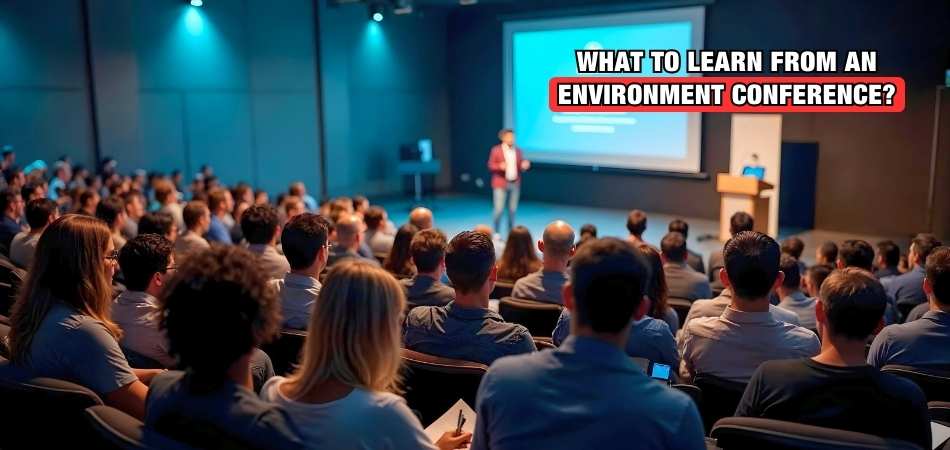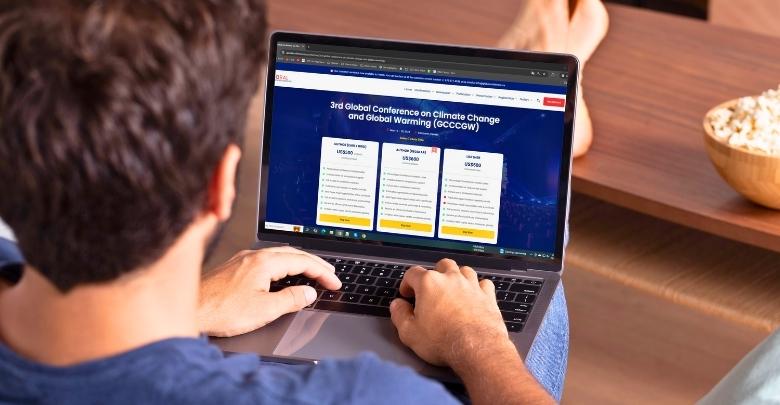In an era where climate change, biodiversity loss, and sustainable development dominate global conversations, environment conferences offer invaluable platforms for discussion and action. These events bring together policymakers, scientists, activists, and innovators to address some of the most pressing environmental challenges of our time.
But beyond the headlines and high-level discussions, what to learn from an environment conference is a question that resonates with individuals and communities alike.
At an environment conference, you can gain insights into current environmental challenges, discover advanced technologies, and learn about policies shaping global sustainability efforts. These events also provide opportunities to connect with diverse perspectives, learn actionable strategies, and get inspired by real-world success stories in environmental advocacy.
Are you curious about the full scope of learning these conferences offer? Continue reading to gain detailed insights and practical takeaways that can empower you to make meaningful environmental change.
Are International Environmental Conferences Impactful?
International environmental conferences play a crucial role in addressing global ecological challenges. These events bring together experts, policymakers, and innovators from around the world to collaborate on sustainable solutions. By promoting cross-border discussion, they help unify efforts to combat climate change, protect biodiversity, and promote eco-friendly technologies.
One of the main impacts of these conferences is their ability to drive policy changes and global initiatives. Agreements and action plans stemming from such events often set the stage for transformative environmental strategies. They also provide a platform for developing nations to voice concerns and collaborate on shared solutions.
Among the different conferences, the Canadian international environmental conference is recognized globally for its significant contributions to environmental progress. Attending an upcoming environmental conference in Canada enables global leaders and innovators to explore sustainable practices, enhancing Canada’s reputation as a leader in environmental protection.
What to Learn From an Environment Conference?
Environment conferences offer a wealth of learning opportunities that go beyond the surface of discussions. They provide a platform to gain valuable insights, support connections, and inspire action toward a sustainable future. Here are the key areas you can learn from at an environment conference.
Identifying Current Environmental Challenges
One of the primary lessons is a deeper awareness of the pressing environmental challenges facing the planet. Topics like climate change, deforestation, biodiversity loss, and pollution are often central themes. Experts discuss the root causes and long-term implications of these issues, helping attendees grasp their global significance. These sessions provide a broader context, enabling participants to connect the dots between local and global environmental concerns.
Discovering Innovative Solutions and Technologies
Environment conferences serve as a showcase for the latest innovations and sustainable technologies. From advancements in renewable energy to advanced conservation tools, attendees can learn about the latest developments driving progress in environmental fields. These insights can spark ideas for integrating these innovations into various industries or communities, making sustainability a practical and achievable goal.
Learning About Policy and Global Agreements
Another crucial area of learning is the role of policy and international agreements in shaping environmental actions. Conferences often include discussions about regulations, government initiatives, and global frameworks. Attendees can advocate for and align with global sustainability efforts in their professional or personal endeavors by understanding these policies.
Networking and Collaborative Opportunities
Networking is a powerful tool, and environmental conferences provide ample opportunities to connect with like-minded individuals. Engaging with researchers, activists, industry leaders, and policymakers helps attendees learn from their experiences and gain fresh perspectives. Collaboration often stems from these connections, leading to partnerships and joint efforts on sustainability projects.
Practical Strategies for Action
Many conferences offer hands-on workshops, case studies, or practical sessions aimed at teaching actionable strategies for sustainability. Participants can learn about topics such as waste management, energy efficiency, and conservation practices. These sessions enable attendees to translate theoretical knowledge into real-world applications, creating tangible benefits for their organizations or communities.
Global Perspectives and Regional Approaches
Environment conferences often bring together speakers and attendees from diverse cultural and geographic backgrounds. This diversity provides insights into how different regions tackle environmental challenges. Learning about global perspectives supports inclusivity and encourages the adoption of practices that respect cultural and regional differences while achieving common goals.
Inspiring Success Stories
Hearing about real-world success stories is another highlight of attending these conferences. Whether it’s a community’s renewable energy project or an innovative conservation initiative, these stories showcase what’s possible when people work together for a sustainable future. Such examples inspire attendees to take similar actions in their spheres of influence.
Environment conferences are a hub of knowledge, innovation, and inspiration. They provide the tools and connections needed to make meaningful contributions to sustainability. By attending, you can learn from experts, explore solutions, and take away actionable insights that empower you to drive positive change.
How to Participate in an Environmental Conference?
Conferences provide valuable opportunities to connect, learn, and contribute to sustainability. To make the most of your experience, here are some effective ways to get involved and stay engaged.
Register and Prepare in Advance
Start by registering for the conference and obtaining your invitation letter well before the event date to secure your spot. Familiarize yourself with the agenda, keynote speakers, and workshop offerings. Preparing ahead allows you to plan which sessions to attend and what topics to prioritize, ensuring a focused and rewarding experience.
Engage in Key Sessions and Workshops
Attend keynote speeches, panel discussions, and workshops that align with your interests or expertise. These sessions provide insights into crucial environmental issues and innovative solutions. Pay attention to discussions, take notes, and identify actionable takeaways that you can apply to your work or community initiatives.
Network with Other Participants
Networking is a central aspect of environmental conferences. Introduce yourself to fellow attendees during breaks, meals, or social events. Engaging in meaningful conversations can lead to valuable connections, collaborations, and even long-term partnerships. Listening actively and sharing your own experiences builds stronger connections.
Explore Exhibitions and Booths
Most environmental conferences highlight exhibitions featuring cutting-edge technologies, innovative research, and sustainability initiatives. Exploring these booths is among the most engaging things to do at environmental conferences, offering a firsthand look at the latest advancements and practical applications of environmental solutions.
Contribute to Discussions
Be an active participant during Q&A sessions or roundtable discussions. Asking thoughtful questions or sharing your perspective enriches the conversation for everyone. Your input can lead to further discussion and help you connect with both speakers and attendees who share your interests.
Follow Up After the Event
Once the conference ends, reach out to the people you connected with to maintain the relationships you’ve built. Whether it’s through email, LinkedIn, or other platforms, following up keeps the conversation going and opens doors to future collaborations.
Why Are Environmental Conferences a Must in Today’s World?
Environmental conferences are essential platforms for addressing the urgent challenges our planet faces. They bring together global experts, innovators, and decision-makers to discuss solutions and inspire action. Here’s why these conferences are indispensable in today’s world.
Driving Global Collaboration
Pollution, deforestation, and climate change are examples of global environmental problems that call for cooperation. Conferences provide a space where governments, businesses, and NGOs can collaborate across borders. This unified approach advances innovative solutions and promotes shared accountability in tackling environmental crises.
Shaping Policy and Advocacy
Environmental conferences play a crucial role in influencing policies and advocacy efforts worldwide. Experts and policymakers discuss strategies for implementing sustainable practices and regulatory frameworks. The importance of environmental conferences lies in their ability to inspire actionable commitments and policies that build a greener future.
Promoting Education and Awareness
Conferences are vital for educating the public and stakeholders about pressing environmental issues. Sessions often include data-driven presentations, workshops, and success stories that provide a deeper awareness of the planet’s challenges. This awareness motivates individuals and organizations to adopt sustainable practices in their daily lives.
Showcasing Innovations
Advancements in green technology and sustainable practices are often highlighted at these events. From renewable energy solutions to waste management innovations, attendees gain exposure to advanced tools and ideas. These showcases help industries adopt eco-friendly technologies that reduce environmental impact while improving efficiency.
Building Community and Shared Vision
Environmental conferences create a sense of community among participants, promoting a shared vision for sustainability. Attendees from diverse backgrounds connect, share experiences, and build partnerships. This collective spirit drives long-term collaboration and amplifies the impact of individual efforts.
Inspiring Action Through Success Stories
Hearing about successful initiatives and projects motivates attendees to implement similar practices in their contexts. These real-world examples demonstrate the tangible benefits of sustainability and provide practical roadmaps for replication.
Environmental conferences are more than just meetings—they are catalysts for change. By developing collaboration, shaping policies, and showcasing innovation, they address crucial global challenges and drive action toward a sustainable future. Their relevance and necessity have never been greater in today’s interconnected world.
Tips to Maximize Your Learning Experience at an Environment Conference
An environment conference is a great way to gain new knowledge and gain actionable insights. With the right strategies, you can make the most of every session and interaction. Below are some tips to maximize your conference learning:
- Plan Your Schedule in Advance: Review the agenda and select the sessions, workshops, and keynotes that align with your interests. A clear plan helps you focus on what’s most relevant and ensures you don’t miss valuable opportunities.
- Engage Actively During Sessions: Actively listen, take detailed notes, and ask thoughtful questions during presentations and panel discussions. Engagement deepens your perspective and allows you to explore topics more thoroughly.
- Network with Intent: Connect with speakers, panelists, and fellow attendees to exchange ideas and experiences. Networking can open doors to new perspectives and collaborative opportunities.
- Visit the Exhibits and Demonstrations: Spend time exploring exhibition booths and live demonstrations. These areas often showcase innovative technologies and initiatives that can provide practical insights and inspiration.
- Participate in Interactive Workshops: Join hands-on workshops that allow you to dive deeper into specific topics or skills. These sessions often offer actionable tools you can apply to your work or studies.
- Reflect and Review at the End of Each Day: Take a few moments to review your notes and reflect on what you’ve learned. Identifying key takeaways ensures the information stays fresh and helps you prioritize actionable insights.
- Be Open to New Ideas: Approach the conference with an open mind and a willingness to learn. Consider diverse perspectives and innovative solutions, even if they challenge your current knowledge.
- Follow-Up After the Event: Reach out to the people you connected with and revisit session materials or resources shared during the conference. Following up helps reinforce your learning and keeps the momentum going.
FAQs
Environment conferences are rich learning grounds for professionals, students, and enthusiasts. From identifying global challenges to exploring actionable solutions, these events provide opportunities to grow and contribute to sustainability. Here are common questions about what to learn from an environment conference.
How Can Environment Conferences Enhance Your Problem-Solving Skills?
Environment conferences expose attendees to real-world case studies and innovative strategies for solving ecological challenges. This hands-on exposure improves problem-solving abilities, enabling participants to apply creative, practical solutions to environmental issues in their personal or professional endeavors.
What Role Do Cultural Perspectives Play in Learning at These Conferences?
Conferences gather individuals from diverse cultural backgrounds, offering individual insights into how different regions tackle ecological concerns. These perspectives help inclusivity, allowing attendees to integrate global approaches while respecting regional differences in their sustainability strategies.
How Do Environment Conferences Strengthen Leadership Skills?
Interactive sessions and workshops help attendees strengthen leadership skills such as effective communication, teamwork, and decision-making. These skills are essential for advocating sustainability initiatives, leading impactful projects, and driving positive change within organizations or communities.
What Insights Can You Gain About Public-Private Partnerships?
These conferences often highlight successful collaborations between governments and private sectors. By valuing these partnerships, attendees can learn strategies for aligning economic growth with ecological goals, inspiring similar collaborations in their industries or fields.
How Do Environment Conferences Shape Your Knowledge of Local and Global Interconnectivity?
Participants gain a deeper appreciation of the link between local actions and global outcomes. Discussions about resource management, climate policies, and sustainability practices reveal how individual efforts contribute to overarching global environmental objectives, promoting a holistic awareness of interconnected systems.
Final Thought
An environment conference is a useful opportunity to gain insight into pressing challenges, explore innovative solutions, and engage with global perspectives. By actively engaging in discussions and sessions, you now know what to learn from an environment conference and how it shapes your approach to sustainability.
To maximize your experience, stay curious, network thoughtfully, and apply the insights you gain to real-world actions. Every step you take contributes to meaningful change. Best wishes as you continue your journey toward environmental advocacy and impactful progress!








